#time use
Explore tagged Tumblr posts
Text
A Crash Course to Kendrick's Super Bowl Performance, from a Black Woman
Note: this does NOT go in depth into all of the song's lyrics. I don't have time to recount two decades of his discography. This is just a summary of the performance itself.
Let's start with the first visual we get:
UNCLE SAM - most notably recognized from WWII American wartime propaganda, Uncle Sam is the personification of American patriotism and freedom. The term "uncle" is also evocative of Uncle Tom from Uncle Tom's Cabin, an abolitionist book that aided in inciting the Civil War. Uncle is also a very common term (both endearment and derogatory) towards Black men (eg. "unc"). Samuel L Jackson was fantastic. (Edit: and please look up his history of civil rights activism, he was on the FBI watchlist and even a pallbearer at MLKJr’s funeral.)
Uncle Sam also resembles a circus ringleader, notable for my next point:
THE GREAT AMERICAN GAME - no, not Super Bowl. The GAG is us the people being pitted against each other: through late-stage capitalism, through the culture war, through class warfare, through being built of the backs of slaves. We are all players in the GAG because none of us on this site were the oligarchs seated at the inauguration.
This is also seen as Kendrick's stage was a Play Station controller. Not only did it remind of circus rings visually, but it was a game battle stage. The Great American Game is a battle royale of the commoners for the amusement of the rich whites.
Remember the foods / Them color was tin and brown / But now they 100 and blue - For this I'll just say, look what the last election said about lowering the price of eggs... and look at the prices now.
The revolution about to be televised / You picked the right time / But the wrong guy - Election 2024 once more. *Edit to add, the first part of this lyric is in reference to the Black Liberation Song "The Revolution Will Not Be Televised" by Gil Scott-Heron. Thanks to everyone who mentioned that.
THE FLAG DANCERS - yes, the dancers formed the US flag... off of the backs of Black people. Not a single white person in sight, and that's true of the cotton pickers in the fields. Plantations are part of how the US came to economic prominence after being a "backwater" colony. Remember tobacco? Cotton? Our bloodlines do. *Edit to add: they also all piled out of a clown car. The US flag in a clown car? Brilliant.
The red and blue dancers are also notable for representing the Crips and Bloods, two infamous street gangs. The dance in Not Like Us is the Crip Walk. I recommend researching more on your own time about them, but just know they are a large part of the stereotype of Black people being "ghetto."
TOO LOUD, TOO RECKLESS, TOO GHETTO. Do you really know how to play the game? - This is exactly what Black people, especially Black men, get told all the time. It's why we change our names on resumes if they sound "too Black." It's why we codeswitch in non-Black company. This is especially rich considering how non-Black people love our culture and love to make money off of us, as the latter part of the quote points to. And it's even more profound during the Super Bowl-- the NFL is majority Black players.
STREET LIGHT A CAPELLA -- "thug" stereotype dancers to counteract the a capella connotations, with Uncle Sam then saying that Kendrick figured out "bringing other street guys around being a culture cheat code." Yes, this is a direct hit at Drake (listen to "Not Like Us") but also politically. Look up "model minority". Notably I would point to Candace Owens, or the Miami Venezuelan political group that's been in the news recently, especially as this directly led to Kendrick being surrounded by...
DANCERS IN WHITE -- it's white America. That's... that's the allegory.
NOT LIKE US TEASER -- Kendrick says "Not Like Us" is "their favorite song." -> he means white people specifically here. It comes after he's surrounded by all white dancers, the women around him who are his call and response are also in white (my opinion, they represent the industry). He's saying "Not Like Us" is the favorite of yts because it is about BLACK MEN FIGHTING. This again is reflected in the video game stage and ringleader Uncle Sam.
SZA -- instead of giving what they want, we see SZA. She's one of Drake's exes and Kendrick has always supported her.
ALL THE STARS -- This was in the first Black Panther movie, which I recommend you watch. Rest in Power Chadwick. Notably, this movie was incredibly mainstream as a major Marvel movie, and then we have Uncle Sam say...
"THAT'S WHAT AMERICA WANTS: NICE AND CALM. DON'T MESS THIS UP" -- translation: Marvel (the industry, America, etc.) wanted a safe, semi-pop song because white American likes safe pop songs, not Kendrick's usual heavy rap style about his life as a Black man! Don't mess up what you've got going mainstream for having this "Black rap feud" with Drake, who is an R&B model minority to white people because he's safe.
So what does Kendrick say?
IT'S A CULTURAL DIVIDE / IMMA GET IT ON THE FLOOR -- He was warned not to be political or apologetically Black for this Super Bowl performance, but he is using this big stage opportunity to speak out.
40 ACRES AND A MULE / THIS IS BIGGER THAN THE MUSIC -- 40 acres and a mule are what the freed slaves were promised. Instead, this land went to white sharecroppers. Research Jim Crow laws.
THEY TRIED TO RIG THE GAME / BUT YOU CAN'T FAKE INFLUENCE -- rig the election, rig the industry like with model minority Drake, rig the Great American Game with culture war to distract from active class warfare.
NOT LIKE US -- the only thing I'll mention because it made me holler is Serena Williams crip walking on Drake's metaphorical grave. She's another one of his exes (read: Drake harassed the hell out of her). *Edit: she was also fined at the 2012 Olympics for crip walking in celebration at Wimbledon.
TURN THE TV OFF -- exactly like he said! The TV is a distraction, the Super Bowl is a distraction, the mainstream news is often a distraction. Turn it off and get with your people!
GAME OVER — could not see this on my stream but at the end of the performance, the lights in the stadium spelled this out. The world is watching, America…
In conclusion, Kendrick Lamar is a visionary and thank you for coming to my TED Talk.
#kendrick lamar#super bowl#immigration#tea time with hawk#samuel l jackson#mcu#sza#kdot#not like us#black history month
44K notes
·
View notes
Text






was thinking about that one blind professor post earlier today and how well it applied to the aptly named Team Dark

(really 'Team Dark' just sounds a lot cooler than 'Team Saves-On-Electricity')

#just another tally added to the board of reasons it's hard to imagine any of these guys ever entertaining guests 👍#the trickiest part of this gag was trying to think of who would ever visit these guys lmao#not the most social of butterflies this group#sth#rouge the bat#amy rose#shadow the hedgehog#e123 omega#team dark#comic#my art#doodles#sonic#sonic the hedgehog#is that really the general tag that gets used? which one of these 3 is the main one here a;sldkjf#anyways first time drawing amy!#I like her funny little shark fin from her classic design
42K notes
·
View notes
Text
I want to step away from the art-vs-artist side of the Gaiman issue for a bit, and talk about, well, the rest of it. Because those emotions you're feeling would be the same without the art; the art just adds another layer.
Source: I worked with a guy who turned out to be heavily involved in an international, multi-state sex-slavery/trafficking ring.
He was really nice.
Yeah.
It hits like a dumptruck of shit. You don't feel stable in your world anymore. How could someone you interacted with, liked, also be a truly horrible person? How could your judgement be that bad? How can real people, not stylized cartoon bogeymen, be actually doing this shit?
You have to sit with the fact that you couldn't, or probably couldn't, have known. You should have no guilt as part of this horror — but guilt is almost certainly part of that mess you're feeling, because our brains do this associative thing, and somehow "I liked [the version of] the guy [that I knew]", or his creations, becomes "I made a horrible mistake and should feel guilty."
You didn't, loves, you didn't.
We're human, and we can only go by the information we have. And the information we have is only the smallest glimpse into someone else's life.
I didn't work closely with the guy I knew at work, but we chatted. He wasn't just nice; he was one of the only people outside my tiny department who seemed genuinely nice in a workplace that was rapidly becoming incredibly toxic. He loaned me a bike trainer. Occasionally he'd see me at the bus stop and give me a lift home.
Yup. I was a young woman in my twenties and rode in this guy's car. More than once.
When I tell this story that part usually makes people gasp. "You must feel so scared about what could have happened to you!" "You're so lucky nothing happened!"
No, that's not how it worked. I was never in danger. This guy targeted Korean women with little-to-no English who were coerced and powerless. A white, fluent, US citizen coworker wasn't a potential victim. I got to be a person, not prey.
Y'know that little warning bell that goes off, when you're around someone who might be a danger to you? That animal sense that says "Something is off here, watch out"?
Yeah, that doesn't ping if the preferred prey isn't around.
That's what rattled me the most about this. I liked to think of myself as willing to stand up for people with less power than me. I worked with Japanese exchange students in college and put myself bodily between them and creeps, and I sure as hell got that little alarm when some asian-schoolgirl fetishist schmoozed on them. But we were all there.
I had to learn that the alarm won't go off when the hunter isn't hunting. That it's not the solid indicator I might've thought it was. That sometimes this is what the privilege of not being prey does; it completely masks your ability to detect the horrors that are going on.
A lot of people point out that 'people like that' have amazing charisma and ability to lie and manipulate, and that's true. Anyone who's gotten away with this shit for decades is going to be way smoother than the pathetic little hangers-on I dealt with in university. But it's not just that. I seriously, deeply believe that he saw me as a person, and he did not extend personhood to his victims. We didn't have a fake coworker relationship. We had a real one. And just like I don't know the ins-and-outs of most of my coworkers lives, I had no idea that what he did on his down time was perpetrate horrors.
I know this is getting off the topic, but it's so very important. Especially as a message to cis guys: please understand that you won't recognize a creep the way you might think you will. If you're not the preferred prey, the hind-brain alarm won't go off. You have to listen to victims, not your gut feeling that the person seems perfectly nice and normal. It doesn't mean there's never a false accusation, but face the fact that it's usually real, and you don't have enough information to say otherwise.
So, yeah. It fucking sucks. Writing about this twists my insides into tense knots, and it was almost a decade ago. I was never in danger. No one I knew was hurt!
Just countless, powerless women, horrifically abused by someone who was nice to me.
You don't trust your own judgement quite the same way, after. And as utterly shitty as it is, as twisted up and unstead-in-the-world as I felt the day I found out — I don't actually think that's a bad thing.
I think we all need to question our own judgement. It makes us better people.
I don't see villains around every corner just because I knew one, once. But I do own the fact that I can't know, really know, about anyone except those closest to me. They have their own full lives. They'll go from the pinnacles of kindness to the depths of depravity — and I won't know.
It's not a failing. It's just being human. Something to remember before you slap labels on people, before you condemn them or idolize them. Think about how much you can't know, and how flawed our judgement always is.
Grieve for victims, and the feeling of betrayal. But maybe let yourself off the hook, and be a bit slower to skewer others on it.
#listen to old auntie Shades#serious#fuck I don't know how to tag this#I should probably read-more this but I'm not sure where#and now I need to go take a walk for my stupid mental health#you never stop processing#you do it over and over and over and over#and hope it gets a bit easier each time#Someone might get upset by using prey#but 'preferred prey' is an important concept from the predator's view#it doesn't mean the people are inherently prey#you feel me?#it's the best word I can find for the concept#neil gaiman#adjacent
25K notes
·
View notes
Text

all that remained were fields of dreamless solitude
only you can show me this
#jayvik#arcane#do you think he kept talking to him for years and years#and discussing the ideas like they used to but he never answered#do you think jayce still has some life to him because he wasn't alone there all this time
32K notes
·
View notes
Text
*lying at a job interview voice* yeah i can sing all of the lyrics of American Pie by Don McLean. WITHOUT slipping into the weird al version. easy
30K notes
·
View notes
Text

#I had a vision#axedraws#artists on tumblr#art#mouthwashing#mouthwashing curly#curly#anya#mouthwashing anya#Daisuke#mouthwashing Daisuke#digital art#mouthwashing fanart#fanart#ignore the fact among us probably did not exist during this time#100#500#1k#5k#10k#20k#chat#chat should I kill myself#have I peaked
26K notes
·
View notes
Text
yknow i never noticed the sheer rareness of images having ids or alt text on this website until i started adding alt text to my art (and trying to remember to add it to any images i post in general, especially text screenshots) and that makes me kinda sad
#i used to be pretty intimidated by the idea of having to describe my art but. it isnt as hard as it sounds#i just treat it like im describing an image i dont have at the time really#plus ive been told that even a simple id is better than no id#lev.txt
70K notes
·
View notes
Text
In regards of the Trump government scraping all trans inclusion in its queer information portion of its websites I have made this thing. Spread the word. Don't let them pretend we never existed.
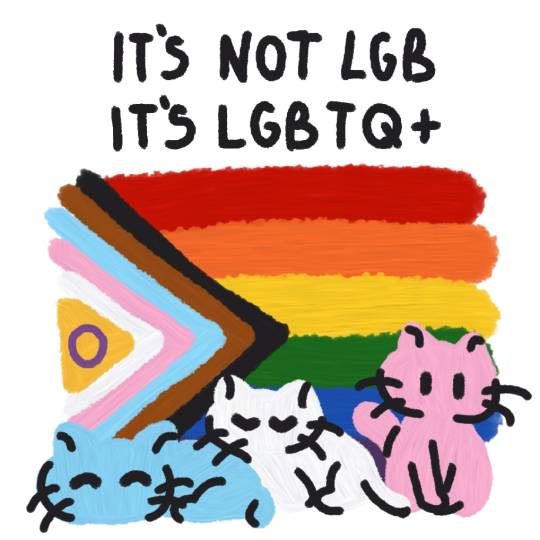

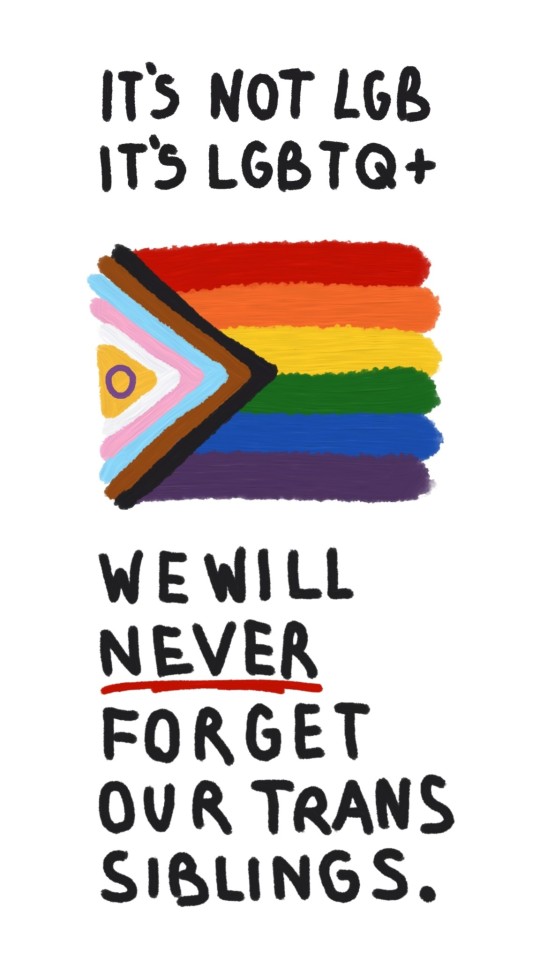
P.S: Don't like! Reblog! <3
EDIT: Well this got a lot of attention! I got a few users asking to print or repost my art and I am unimaginably grateful to everyone's interest, especially since it's a really simple drawing I made on a whim haha! Anyone who is looking to print these out to hang or hand out or repost on another platform is free to do so, although I ask you to credit me and let people know it's from my Tumblr profile! If anyone wishes to do anything else with my art or post and wants to clarify what I consent to then they can message me privately and I'll explain! <333 all my love to my queer siblings
#lgbt#lgbtqia#lgbtq#lgbtq community#lgbtqiia+#lgbtq+#lgbtq+ community#queer community#queer artist#queer#trans pride#queer pride#lgbtq+ pride#my art#for like the first time ever#I dont think I ever posted anything I've drawn here before#trump administration#fuck trump#trump effect#us politics
35K notes
·
View notes
Text
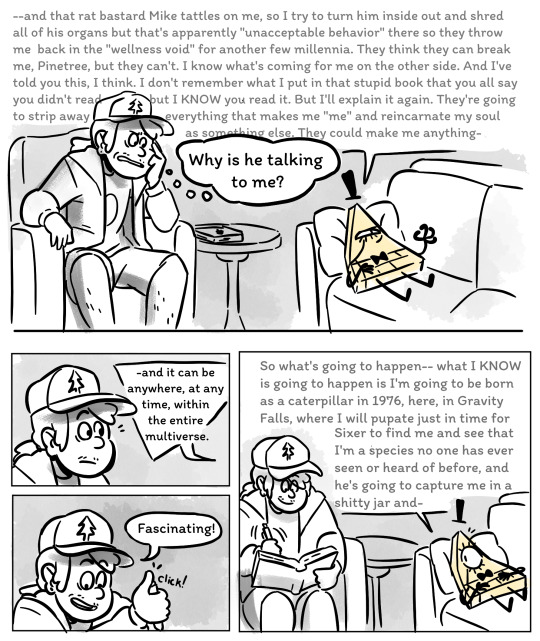
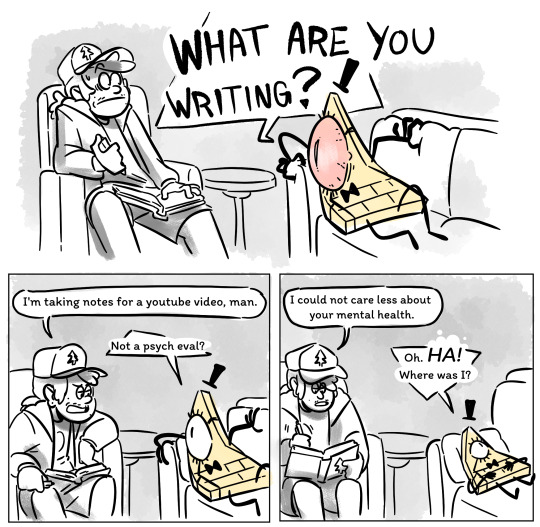
bad youtube clickbait thumbnail that reads "I think I just had a therapy session with a DEMON???"
#gravity falls#gf nevermind all that#the book of bill#bill cipher#dipper pines#theres a tag now so im not gonna link all the context in the post anymore#i have no confidence this one is even funny i just wanted to draw them#we talk about this all the time but its endlessly funny that stump made a billford au and both of us have been like.#so mabel and dipper right? how are mabel and dipper how are they handling the situations. just fine it seems
39K notes
·
View notes
Text
A Pragmatic and surprisingly comforting perspective about the Trump 2nd Presidency from the ACLU
***Apologies if this is how you found out the 2024 election results***
Blacked out part is my name.
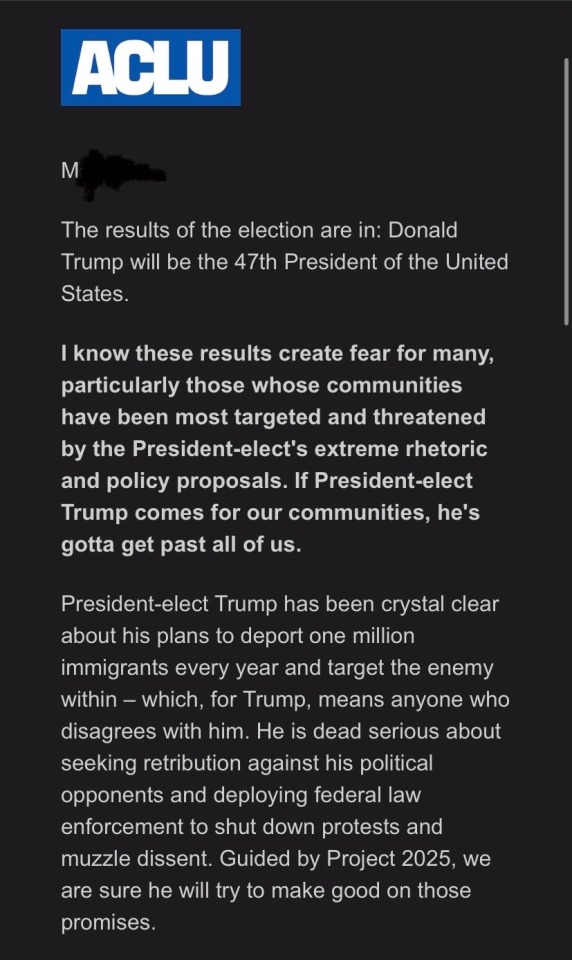

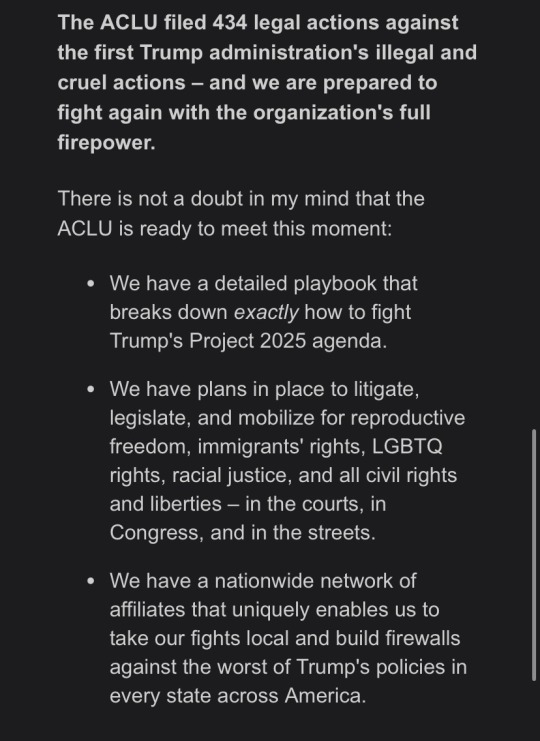
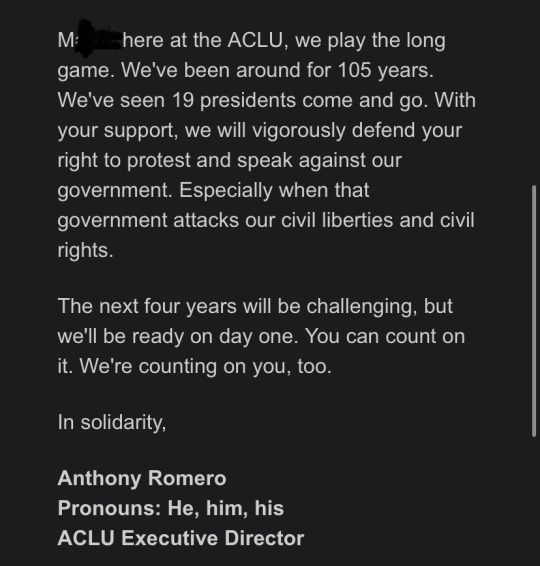
I’m not going to let this make me give up. It’s disheartening, and today I will wallow, probably tomorrow too
AND
I will continue to do my part in my community to spread the activism and promote change for the world I want to live in. I want to change the world AND help with the dishes.
And I won’t let an orange pit stain be what stops me from trying to be better.
A link to donate to the ACLU if able and inclined. I know I am
#us politics#donald trump#election 2024#aclu#a promise to myself#how is this comforting you May ask#bc we are not fighting alone or uninformed#we have good and strong groups in our corners defending what we believe in#it’s not over yet#we have to try and pushback#added Alt image descriptions since this is leaving containment#happy to see many engaging with this to either donate time or money or both#really warms the cold heart of mine#wow this broke containment#overall it’s been pretty nice seeing people engaging with it ready to roll up their sleeves and get to work#they did the travel ban right at the beginning of the previous presidency too#also every major civil battle in the last century#brown V board of education- the one that desegregated schools#loving V Virginia- legalized interracial marriage#roe V wade- legalized abortion#United States V Nixon- watergate scandal WHICH LIMITED US PRESIDENTAL POWER#Edwards v. Aguillard- helped allow schools to teach evolution#Planned Parenthood v. Casey- another abortion case#ACLU v. NSA- to stop the NSA spying on wikipedia users#Ingersoll v. Arlene's Flowers- fought to stop LGBTQ discrimination from businesses#Obergefell v. Hodges- case that legalized gay marriage#literally WAY MORE GUYS#so don’t fall into dispair! these are literally one of the good ones!
26K notes
·
View notes
Text


don't show him modern technology; it won't end well
bonus under the cut:






#i'm not sure if ford would really be interested in using the internet much#but i could see him wanting to look something up real quick and ending up reading something so outrageously wrong#that it pisses him off to the point that he gets into an argument about it lol#gravity falls#stan pines#stanley pines#stanford pines#digital art#my stuff#anyway i really don't like how this one turned out#but i don't feel like changing it#bc i already spent way more time on this than i actually wanted to#and i don't wanna look at it any longer
50K notes
·
View notes
Text
the funniest meltdown ive ever had was in college when i got so overstimulated that i could Not speak, including over text. one of my friends was trying to talk me through it but i was solely using emojis because they were easier than trying to come up with words so he started using primarily emojis as well just to make things feel balanced. this was not the Most effective strategy... until. he tried to ask me "you okay?" but the way he chose to do that was by sending "👉🏼👌🏼❓" and i was so shocked by suddenly being asked if i was dtf that i was like WHAT???? WHAT DID YOU JUST SAY TO ME?????????? and thus was verbal again
#yeehaw#1k#5k#10k#posts that got cursed. blasted. im making these tag updates after... 19 hours?#also i have been told it should say speech loss bc nonverbal specifically refers to the permanent state. did not know that!#unfortunately i fear it is so far past containment that even if i edited it now it would do very little. but noted for future reference#edit 2: nvm enough ppl have come to rb it from me directly that i changed the wording a bit. hopefully this makes sense#also. in case anyone is curious. though i doubt anyone who is commenting these things will check the original tags#1) my friend did not do this on purpose in any way. it was not intended to distract me or to hit on me. im a lesbian hes a gay man. cmon now#he felt very bad about it afterwards. i thought it was hilarious but it was very embarrassed and apologetic#2) “why didn't he use 🫵🏼?” didn't exist yet. “why didn't he use 🆗?” dunno! we'd been using a lot of hand emojis. 👌🏼 is an ok sign#like it makes sense. it was just a silly mixup. also No i did not invent 👉🏼👌🏼 as a gesture meaning sex. do you live under a rock#3) nonspeaking episodes are a recurring thing in my life and have been since i was born. this is not a quirky one-time thing#it is a pervasive issue that is very frustrating to both myself and the people i am trying to communicate with. in which trying to speak is#extremely distressing and causes very genuine anguish. this post is not me making light of it it's just a funny thing that happened once#it's no different than if i post about a funny thing that happened in conjunction w a physical disability. it's just me talking abt my life#i don't mind character tags tho. those can be entertaining. i don't know what any of you are talking about#Except the ppl who have said this is pego/ryu or wang/xian. those people i understand and respect#if you use it as a writing prompt that's fine but send it to me. i want to see it#aaaand i think that's it. everyday im tempted to turn off rbs on it. it hasn't even been a week
149K notes
·
View notes
Text
Oh…. Well, it’s over for Crunchyroll I guess
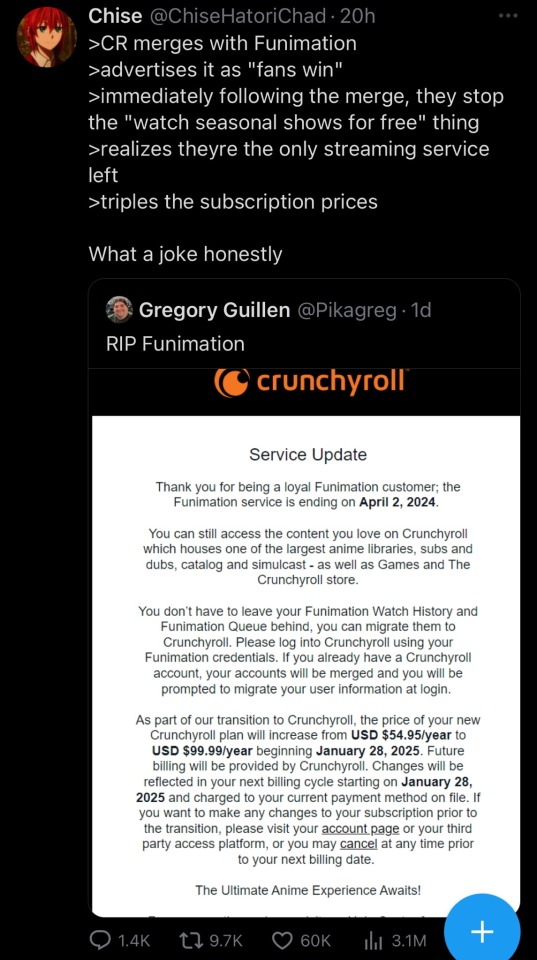
#Crunchyroll#piracy#funimation#money hungry ass streaming service#rambling#I’ve never paid for a streaming service in my life thank god#I appreciated using others accounts but I personally cannot see myself paying this much for a service if I had the funds 😭!#get back to pirating kings!!!#anime has always been one of the easiest forms of media to pirate anyway so y’all got this#CR is definitely not worth paying for though#CR is certainly not worth paying this much for even if it’s a yearly one time fee#capitalism#the fact that CR has always had pretty bad quality as a streaming service anyway#it buffers every time you pause or rewind anything
87K notes
·
View notes
Text
now seems like a good time to remind my fellow alt kids out there that you do NOT wear your political patches on your back.
wear them on the front. that way if someone disagrees and decides to get violent about it, they’re less likely to sneak up on you and catch you off-guard. stay safe.
#edit: yes sadly this includes pride stuff#now’s also a good time to start memorizing some emergency contacts#comments has more info#us politics#donald trump#elon musk#lgbt#trans#queer#punk#punk rock#alt#goth
14K notes
·
View notes
Text
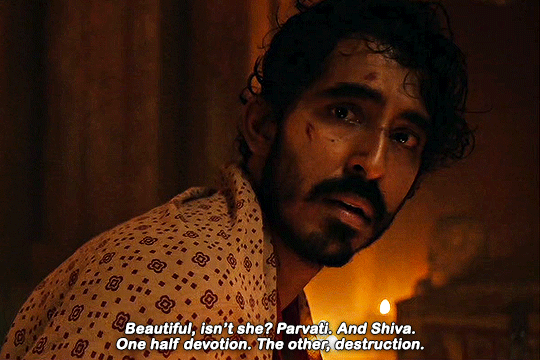

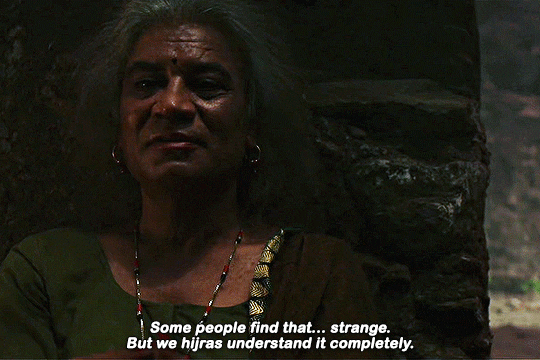
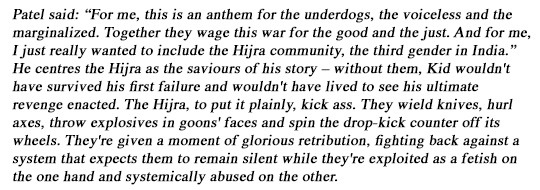









MONKEY MAN (2024)
#augh it was so good i couldn't stop thinking about it#and also i need to rewatch it because i kept getting distracted by dev patel's big beautiful eyes.....#does he have a licence for those#the mythology the politics the sectarian strife the hijra community and outsiders... he wove so many things together so beautifully#and also. he gave us an adorable dog. which is necessary to me.#and also he took his shirt off multiple times.#monkey man#dev patel#vipin sharma#spoilers#long post#transgender#lgbt#lgbtq#lgbtqia
44K notes
·
View notes